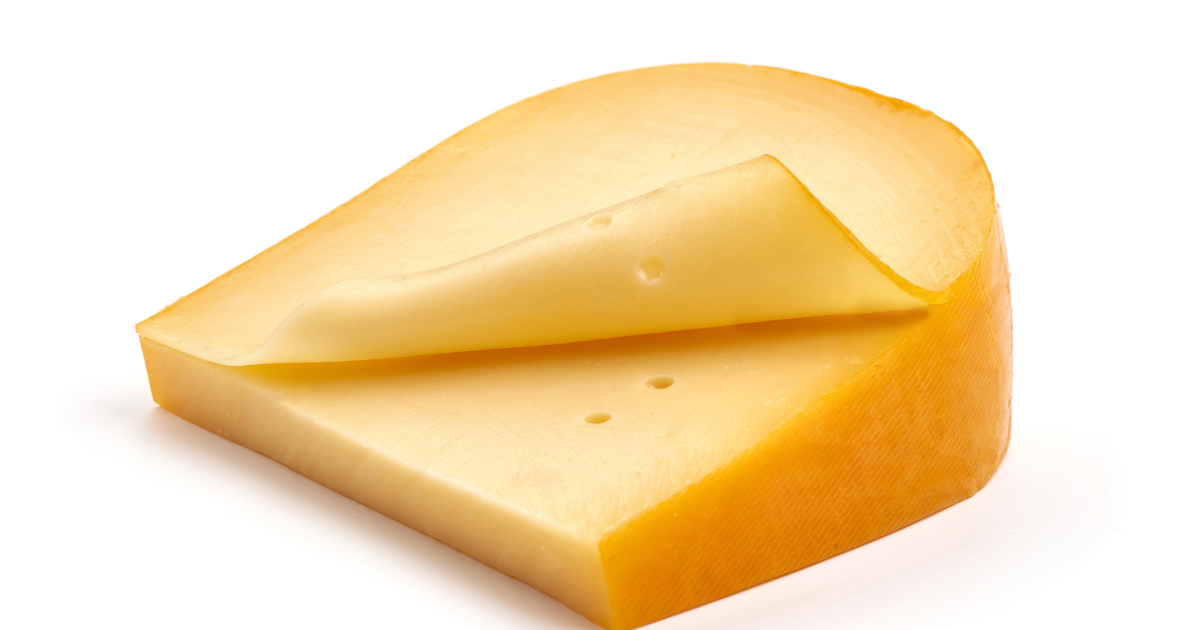Emmental and Gouda are two of the most popular cheeses around the world. Both originally come from the Netherlands and have a delicious, nutty flavor.

But there are some key differences between Emmental, also known as Swiss cheese, and the semi-hard Gouda that's often topped with red wax.
Emmental vs. Gouda
Before diving into the nitty-gritty details, here is a helpful table outlining the main differences and similarities between Emmental and Gouda:
| Emmental Cheese | Gouda Cheese |
|---|---|
| Origin: Switzerland | Origin: Netherlands |
| Texture: Slightly elastic, holey | Texture: Smooth, dense |
| Taste: Mild, nutty | Taste: Sweet, nutty |
| Appearance: Pale yellow, large holes | Appearance: Yellow-orange, small holes |
| Best Uses: Sandwiches, fondue, pizza topper | Best Uses: Table cheese, grilled cheese, mac & cheese |
Key Takeaway: While both cheeses share a nutty flavor, Emmental and Gouda differ notably in terms of their texture, appearance, and best culinary uses.
All About Emmental Cheese
Emmental cheese originated in the Emmental valley region of Switzerland. That's why you'll often see it simply referred to as Swiss cheese.
True Swiss Emmental cheese is made from raw cow's milk using traditional cheesemaking techniques that have been passed down for generations. It gets its distinctive holey appearance from carbon dioxide bubbles that form during production.
When it comes to texture, Emmental has a smooth, slightly elastic feel. As it ages, Emmental becomes firmer in texture while the flavors continue to sharpen.
Emmental's rind remains quite hard even when the cheese is matured for optimum flavor. And those signature holes we expect in Swiss cheese form large, evenly distributed gaps throughout the pale yellow interior.
Flavorwise, Emmental is mild, sweet, and nutty with a fruity aroma. Its sweetness increases during aging while nuttiness takes on a more prominent role.
In terms of uses in cooking, Emmental is a versatile choice. Its excellent meltability makes it perfect for sandwiches, fondues, quiches, pizza, casseroles, pasta bakes, and more. It also pairs well with fruits and nuts as part of a cheese plate.
All About Gouda Cheese
Gouda cheese was originally made in the city of Gouda in the Netherlands using a technique called washed curd, which gives this famous export its unique properties.
Traditional Gouda is made from cow's milk just like Emmental cheese. But it has a lower moisture content that contributes to its denser texture and smaller eyes compared to holey Swiss cheese.
The smooth, dense texture of Gouda makes it perfect for slicing or shredding. As Gouda ages from young to mature varieties, you'll notice it becomes firmer and more crumbly in the mouth.
While Emmental is known for those large gaps scattered throughout, Gouda has a more closed appearance with tiny holes called eyes present. Traditional Gouda wheels have a natural rind that develops a yellowish hue, later topped with red paraffin wax.
Inside, the cheese is a deeper yellow-orange shade owing to its higher fat content versus Emmental. When tasting Gouda, expect flavors of caramel and butterscotch along with nuttiness. Aged Gouda takes on intensified sweetness and pronounced nutty notes.
The melty-smooth nature of Gouda makes it extremely versatile in cooking applications like grilled cheese, mac and cheese, panini, and flatbreads. It also stands up beautifully on cheese trays paired with grapes, apples, figs, or crackers.
Key Takeaway: While both are Dutch-style cheeses with nutty flavor, Gouda is denser with a wax coating compared to holey, elastic Swiss Emmental.
Key Differences Between Emmental and Gouda
While Emmental and Gouda share some common Dutch cheese characteristics, there are a few noteworthy ways in which they differ:
Texture
Emmental has an elastic texture and signature holes, while Gouda is dense and smooth.
The distinctive holes and elastic body of Emmental come from the cheesemaking process. Gouda achieves its dense smoothness from a higher moisture content.
Taste
Gouda tends to taste richer and sweeter compared to mild Emmental.
The fuller fat content gives Gouda a more buttery, caramelized flavor compared to Emmental's relatively mild nutty sweetness.
Appearance
Emmental cheese has pale yellow color with big holes evenly distributed throughout. Gouda has a deeper orange hue and scattered tiny eyes.
Again, the differences in appearance come down to production method. Gouda simply doesn't form the large carbon dioxide bubbles you see in Emmental during cheesemaking.
Best Uses
Gouda works well in melted applications like grilled cheese while Emmental is the better choice for eating straight in chunks.
The concentrated flavor and denser body of Gouda make it ideal for incorporating into hot melty dishes. The milder sweeter notes of Emmental cheese shine through better when eaten straight in slices, cubes or chunks.
While these are some clear points of difference, Emmental and Gouda still share a number of similarities that cheese lovers can appreciate.
Key Takeaway: Emmental and Gouda differ most notably when it comes to their texture, taste, appearance, and best uses in cooking.
Important Similarities Between Emmental and Gouda
Despite the differences outlined above, Emmental and Gouda still have a lot in common as Dutch-style cheeses including:
- Milk Source: Both are made from cow's milk.
- Aging: Aged varieties of either cheese intensify in flavor over time. Matured Emmental and Gouda become nuttier and sweeter.
- Western Europe Origins: They originate from neighboring countries Switzerland and the Netherlands.
- Nutritional Value: High in protein, calcium and fat compared to other cheese types, they can both fit into a balanced diet when properly portioned.
- Melting Abilities: Thanks to a relatively low moisture content, both melt beautifully into fondues, dips, baked dishes, sandwiches and more.
- Pairings: Fresh or dried fruits, nuts, crackers or bread all perfectly complement Emmental and Gouda's flavor profiles.
- Availability: Their popularity and wide appeal makes both cheeses easy to find at any grocery store or cheese shop.
So you really can't go wrong keeping some Emmental and Gouda in your fridge cheese drawer!
FAQs
Is Emmental or Gouda cheese stronger in flavor?
Gouda tends to have a more pronounced flavor thanks to its fuller fat content and aging process. Emmental is relatively mild in taste, even when properly aged.
Can you use Emmental as a substitute for Gouda or vice versa?
Yes, you can safely substitute Emmental and Gouda in most recipes. Just keep in mind differences in meltability, oiliness, and depth of flavor. Using one versus the other may slightly alter the end result.
Which melts better in cooking applications – Emmental or Gouda?
Gouda wins when it comes to melting ability. Its smoothness creates perfect melted cheese pulls on everything from grilled cheese to baked pasta. Emmental can work but may become oily or split more easily.
Is Emmental or Gouda the healthier choice?
Neither can be considered a diet cheese. While their fat, calories and sodium varies slightly, both remain high in saturated fat. Gouda may contain slightly higher amounts thanks to its rich flavor. For healthier eating, enjoy either cheese in moderation as part of balanced meals.
Can you freeze Emmental or Gouda to extend shelf life?
Freezing does work for either cheese but will compromise texture. Make sure to double wrap in plastic then foil before stashing away for up to 6 months. Thaw overnight in the fridge before enjoying again.
Conclusion
While Emmental and Gouda share common Dutch cheese heritage, they have distinct differences that may make you favor one over the other.
Gouda offers a richer, sweeter depth of flavor thanks to its dense texture and aging potential.
Emmental provides more mild nutty notes with its trademark holes and elastic body.

